Building Resistance on Trump Island
The Indypendent
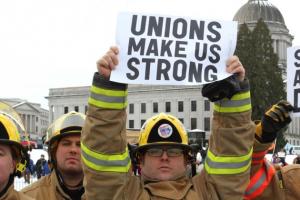 As their membership and resources have continued to dwindle, unions are trying to figure out how best to respond to the current moment. With a Trump inauguration fast approaching and the Republicans taking control of the Supreme Court, the United States Congress, a majority of governorships, and over two-thirds of state legislatures, this choice has become even more urgent than it already was.
As their membership and resources have continued to dwindle, unions are trying to figure out how best to respond to the current moment. With a Trump inauguration fast approaching and the Republicans taking control of the Supreme Court, the United States Congress, a majority of governorships, and over two-thirds of state legislatures, this choice has become even more urgent than it already was.
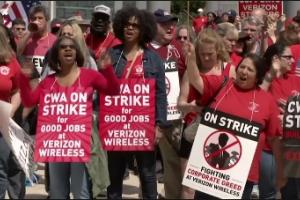 Verizon workers went on strike one week before a competitive New York state primary in which a socialist is running. You had a credible national candidate for president on a nationally-televised debate calling out the CEO of a big corporation. That just does not happen very often. Given the current climate, Hillary Clinton made a big point of coming to our picket line the first day of the strike, Bill went to a picket line in Buffalo.
Verizon workers went on strike one week before a competitive New York state primary in which a socialist is running. You had a credible national candidate for president on a nationally-televised debate calling out the CEO of a big corporation. That just does not happen very often. Given the current climate, Hillary Clinton made a big point of coming to our picket line the first day of the strike, Bill went to a picket line in Buffalo.
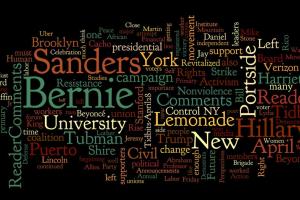 Reader Comments: Puerto Rican Coalition Against Debt Formed; Verizon Strike; Sanders, Hillary and a Revitalized Left; Sanders Allies - June Conference - Future of the Movement; Beyoncé's Lemonade; Harriet Tubman currency; and more;
Announcements: Ways to Justice - Perspectives on Nonviolence, Civil Resistance and Self Defense; ALBA/Puffin Award for Human Rights Activism - 80th Annual Celebration Abraham Lincoln Brigade; Rise of the Right forum (California and New York)
Reader Comments: Puerto Rican Coalition Against Debt Formed; Verizon Strike; Sanders, Hillary and a Revitalized Left; Sanders Allies - June Conference - Future of the Movement; Beyoncé's Lemonade; Harriet Tubman currency; and more;
Announcements: Ways to Justice - Perspectives on Nonviolence, Civil Resistance and Self Defense; ALBA/Puffin Award for Human Rights Activism - 80th Annual Celebration Abraham Lincoln Brigade; Rise of the Right forum (California and New York)
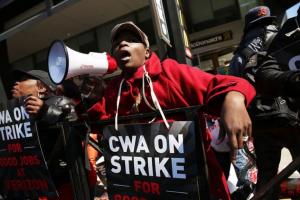 Corporate media coverage of the Verizon strike illustrates the fundamental asymmetry of power that still exists between multi-billion-dollar corporations and comparatively small unions. Due to the support of major Democrats like Bernie Sanders and (to a lesser extent) Hillary Clinton, the voices of strikers like those at Verizon are not entirely lost, but the deck is still heavily stacked in management's favor.
Corporate media coverage of the Verizon strike illustrates the fundamental asymmetry of power that still exists between multi-billion-dollar corporations and comparatively small unions. Due to the support of major Democrats like Bernie Sanders and (to a lesser extent) Hillary Clinton, the voices of strikers like those at Verizon are not entirely lost, but the deck is still heavily stacked in management's favor.
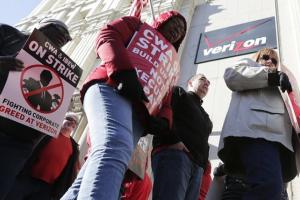 Strikes can be legally threatening and socially disruptive. But in the absence of any serious, social efforts to change the economy, it is perfectly reasonable for workers to defend their interests. So long as the economy is as radically unequal and oppressive as it is, workers have a right to strike. They have that right just the way anyone facing oppression has a right to resist it.
Strikes can be legally threatening and socially disruptive. But in the absence of any serious, social efforts to change the economy, it is perfectly reasonable for workers to defend their interests. So long as the economy is as radically unequal and oppressive as it is, workers have a right to strike. They have that right just the way anyone facing oppression has a right to resist it.
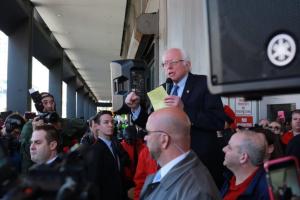 On the same day that Bernie Sanders walked the picket line with CWA and IBEW unionists on strike against Verizon, he gained the endorsement on New York's Transit Workers Union. TWU Local 100 president John Samuelsen said, "Bernie Sanders has been fighting against the 'powers that be' in this country on behalf of all American workers his entire life."
On the same day that Bernie Sanders walked the picket line with CWA and IBEW unionists on strike against Verizon, he gained the endorsement on New York's Transit Workers Union. TWU Local 100 president John Samuelsen said, "Bernie Sanders has been fighting against the 'powers that be' in this country on behalf of all American workers his entire life."
Spread the word